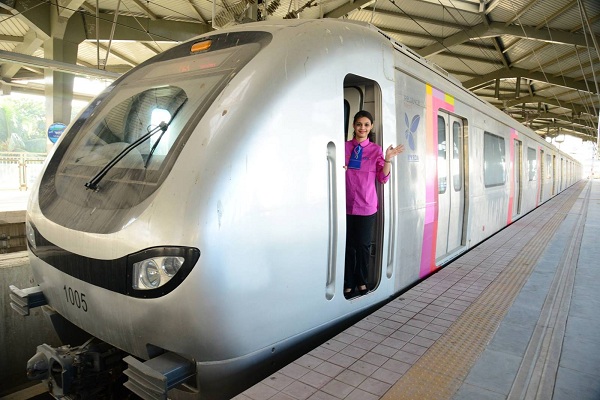
by admin | May 25, 2021 | Corporate, Corporate Governance, Economy, News
 Mumbai:(IANS) Reliance Infrastructure’s Mumbai Metro, already noted for its spotless clean environs, is now all set to become ‘germ free’ with a new hygiene initiative, an official said here on Saturday.
Mumbai:(IANS) Reliance Infrastructure’s Mumbai Metro, already noted for its spotless clean environs, is now all set to become ‘germ free’ with a new hygiene initiative, an official said here on Saturday.
A series of trials were conducted by an international independent agency to test the bacterial loads, identifying the right set of disinfectants and spraying them to successfully bring down the bacterial loads on washroom basins, floors and door handles to negligible levels.
“The highly effective sanitation and hygiene programme made a soft loanch at Ghatkopar, Andheri and Sakinaka Metro stations. As a part of its Swachh Metro Abhiyaan, the new initiative was formally unveiled to mark the first anniversary of the launch of the Swachh Bharat campaign,” the official said.
This has taken to a whole new level of sanitation and hygiene operations in Mumbai Metro that are comparable with the best practices adopted by most of the top-flight healthcare institutions for their public areas and OPDs, as well as five-star hospitality establishments around the world.
A commuter – Metro Hero Sameer Bhatt – was honoured for stopping a co-passenger from spitting on the Airport Road Station platform and later handing him over to the concerned authorities.
BMC Commissioner Ajoy Mehta felicitated Bhat, the Mumbai Metro staff, officials and others for maintaining cleanliness in the presence of Mumbai Metro One Pvt. Ltd. CEO A.K. Mishra
Its much-appreciated cleanliness model involved rigorous manual and mechanical cleaning of the trains, station premises, internal roof, station equipment and depot buildings.
While light cleaning work is done every night, heavy cleaning work is carried out every 45 days besides pest control every 90 days on the network which carried over 12 crore commuters since its launch last year.

by admin | May 25, 2021 | Corporate, Corporate finance

Mumbai:(IANS) In a major relief to lakhs of commuters, the Mumbai Metro One Pvt. Ltd. has decided to freeze the existing fare structure till October 31, though the Fare Fixation Committee has permitted a fare in the band of Rs.10-110, an official said here on Monday.
Simultaneously, the MMOPL will approach the state government for operation and capital subsidies and unlock the potential of non-fare sources of revenue as permitted.
The current fare for the city’s first – and so far only Metro (presently 11.4 km long) is Rs.10, Rs.20, Rs.30 and Rs.40 depending on the distance.
“After October 31, the situation will be reviewed and the fare will be gradually increased depending upont he response of state government on various proposals of revenue enhancement,” the MMOPL said in a statement.
A three-member committee of the central government in April, had recommended the fare hike earlier this month after analyzing all aspects including cost to operate the line and alternate modes of transport.
The recommendations came after considering the reports of four expert committees appointed by it earlier, and the FFC recommended fare is lower than the fare proposed by these experts committees.
“We welcome the recommendations by the FFC, which has taken into consideration the cost to operate the line, business viability and the value propositions that metro brings-in to its commuters,” said MMOPL CEO Abhay Kumar Mishra.
He added that while at the business level, MMOPL continues to make significant cash losses, considering the interest of commuters, it was decided to maintain the existing fare for the time being while they engage with the state government and other authorities to progress on leads given by the FFC/experts.
The FFC order said: “We have considered reports submitted by the four expert committees. In terms of reports, we find that they have suggested higher average fare. However, we are fixing the fare hereunder, which works out to be a lower average fare than the average fare suggested by the four expert committees.”
MMOPL is not strictly comparable with other Metros in the country because other Metros have the advantage of concessional interest and lower power tariff, whereas MMOPL is paying commercial rate of interest and a very high electricity cost.
The FFC experts also suggested that MMOPL should be granted Metro operational subsidy by the government in order to keep the fare affordable and should fully monetise the potential of real estate available at metro properties, to ensure business viability.
It is a common practice across the globe to provide operational subsidy to transportation services which leads to business viability and fare affordability for a larger section of commuters, it said.

 Mumbai:(IANS) Reliance Infrastructure’s Mumbai Metro, already noted for its spotless clean environs, is now all set to become ‘germ free’ with a new hygiene initiative, an official said here on Saturday.
Mumbai:(IANS) Reliance Infrastructure’s Mumbai Metro, already noted for its spotless clean environs, is now all set to become ‘germ free’ with a new hygiene initiative, an official said here on Saturday.